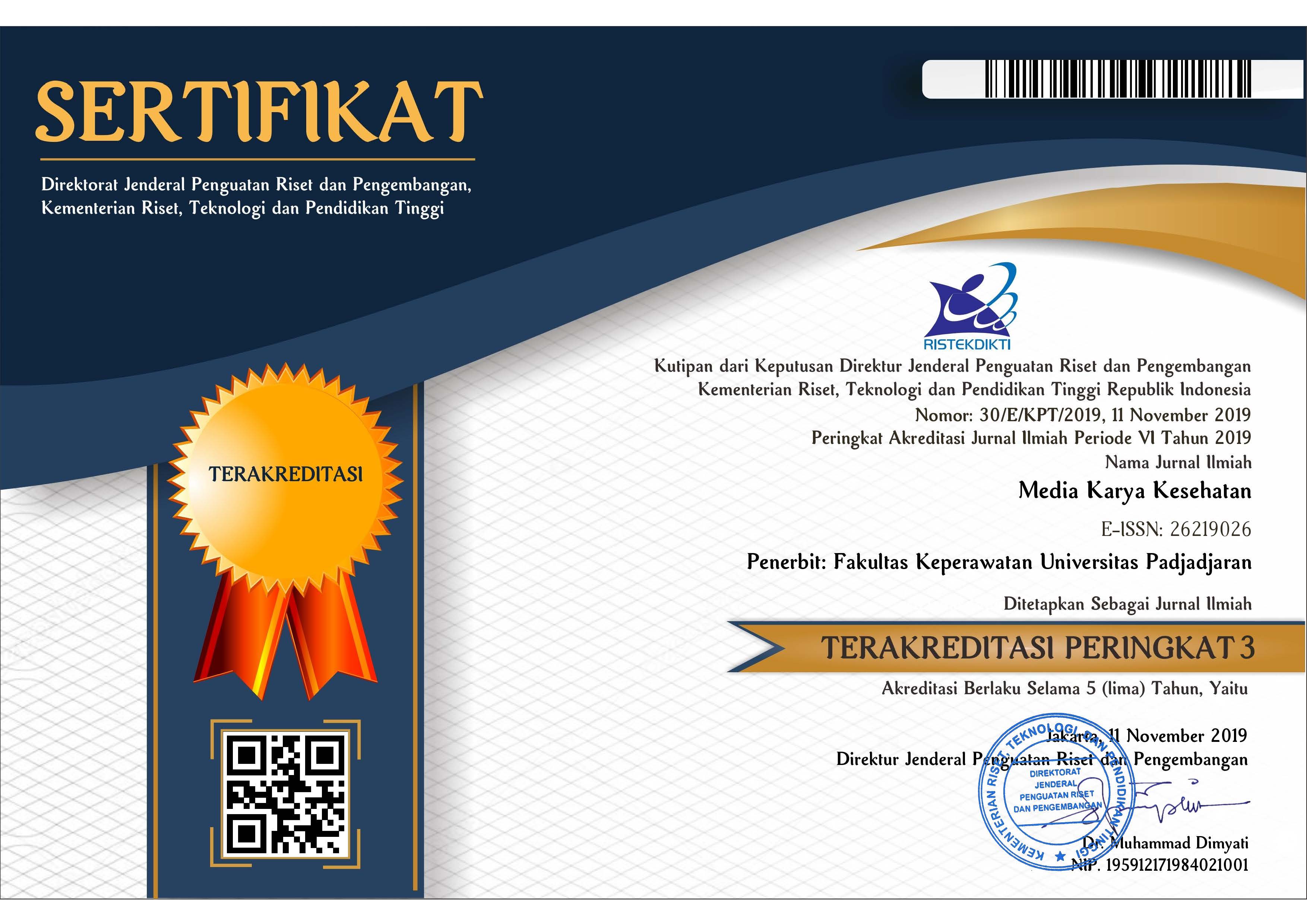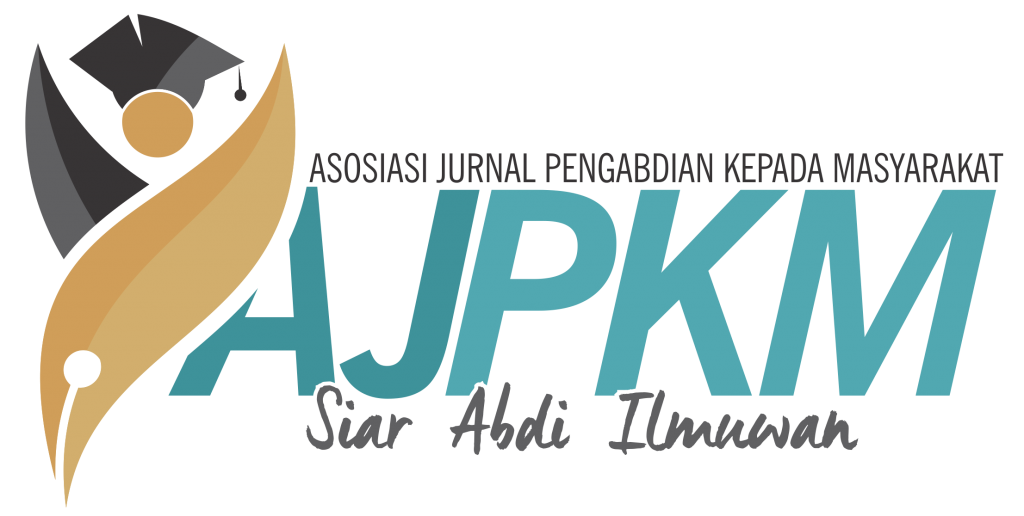Beraksi (Washing Hand, Care Health, Safe from Infection): Health Education to Increase Knowledge of Personal Hygiene and Handwashing
Abstract
Health issues such as diarrhea or worm infections are related to personal hygiene and environmental cleanliness. One contributing factor is handwashing habits. Handwashing is a crucial component of personal hygiene because the consequences of not washing hands can lead to health problems related to the digestive system (diarrhea, worm infections, hepatitis, typhoid, etc.). The objective of this health education is to assess its influence on the knowledge of personal hygiene and handwashing practices among elementary school children at SD Mekasari Sayang in Sumedang district. The implementation method of health education involves using video and poster presentations, lectures, discussions, demonstrations, and simulations with 25 first-grade students of SDN Mekarsari conducted directly. Data analysis utilizes pre-post test design with Wilcoxon statistical testing to identify the significance of differences before and after the health education intervention. The results of the activity demonstrate differences in knowledge and handwashing practices before and after health education using film, posters, discussion, simulation, and demonstration methods (p-value < 0.05). The conclusion drawn from this health education is an improvement in students' knowledge and practices after the intervention. It is hoped that students' awareness and habits regarding personal hygiene behavior will increase, thereby preventing various health problems (diseases) that may arise.
Keywords: Personal Hygiene, health education, handwashing, elementary school students.
Full Text:
PDFReferences
Daftar Pustaka
Alini, & Indrawati. (2018). Efektifitas Promosi Kesehatan Melalui Audio Visual Dan LeafletTentang SADARI (Pemeriksaan PayudaraSendiri) Terhadap Peningkatan Pengetahuan Remaja Putri Tentang Sadari di SMAN 1Kampar tahun 2018. Jurnal Ners, 2(2), 1–9
Al Rahmad, A. H. (2018). Pengaruh Pemberian Konseling Gizi terhadap Penurunan Kadar Kolesterol Darah. Jurnal Kesehatan, 9(2), 241–247.
Andarmoyo, S. (2012). PERSONAL HYGIENE Konsep, Proses, dan Aplikasi dalam Praktik Keperawatan: graha ilmu.
Arifiyanti, N., & Prasetyo, I. (2018). Personal Hygiene Learning in Preschool Classroom. Indonesian Journal of Early Childhood Education Studies, 7(2), 117-124.
Badan Penelitian dan Pengembangan Kesehatan. 2019. Laporan Nasional RISKESDAS 2018. Jakarta. Lembaga Penerbit Badan Penelitian dan Pengembangan Kesehatan.
Daryanto, & Rahardjo, M. (2012). Model Pembelajaran Inovatif. Gava Media.
Departemen Kesehatan RI. (2017)Peraturan Menteri Kesehatan Republik Indonesia Nomor 15 Tahun 2017 tentang Penanggulangan Cacingan. . Jakarta: Kemenkes RI.
Departemen Kesehatan RI (2011). Buku Saku Petugas Kesehatan: Lintas Diare Lima Langkah Tuntaskan Diare. Jakarta: Departemen Kesehatan RI.
Dewi, Siregar, R., & Aristantia, U. (2021). Evaluasi Penggunaan Kombinasi Zink dan
Probiotik pada Penanggulangan Pasien Diare Anak Di Instalasi Rawat Inap RSUD
H. Abdul Manap Jambi Tahun 2020. Pharma Xplore.
Ernawati, E., Asrina, A., & Suharni, S. (2019). Pengaruh Metode Diskusi Terhadap Pengetahuan dan Sikap Tentang Kebersihan Diri. Paper presented at the Prosiding Seminar Nasional Sinergitas Multidisiplin Ilmu Pengetahuan dan Teknologi.
Fitri, Y., Al Rahmad, A. H., Suryana, S., & Nurbaiti, N.(2020). Pengaruh penyuluhan gizi tentang jajanan tradisional terhadap peningkatan pengetahuan dan perilaku jajan anak sekolah. Action: Aceh Nutrition Journal, 5(1), 13–18. https://doi.org/http://dx.doi.org/10.30867/action.v5i1.186
Hall, E., Chai, W., & et al. (2015). Development and validation of a social cognitive
theory-based survey for elementary nutrition education program. Int J Behav Nutr
Phys Act, 12. https://doi.org/10.1186/s12966-015-0206-4
Kementerian Kesehatan (2022). Profil Kesehatan Indonesia tahun 2021. Kementerian Kesehatan Republik Indonesia Jalan HR. Rasuna Said Blok X-5 Kav 4-9, Jakarta 12950
Kusuma, A. N. (2019). Determinan Personal Hygiene Pada Anak Usia 9–12 Tahun. Faletehan Health Journal, 6(1), 37-44.
Merita, M. (2019). Tumbuh Kembang Anak Usia 0-5Tahun. Jurnal Abdimas Kesehatan (JAK), 1(2),83–89
Notoatmojo, S. (2014). Ilmu Perilaku Kesehatan.Rineka Cipta.
Nurjannah, A. (2012). Personal Hygiene Siswa Sekolah Dasar Negeri Jatinangor. Students e-Journal, 1(1), 31. Potter, P. A., & Perry, A. G. (2005). Fundamentals of nursing: Mosby.
Putra, R. K., Kusumo, E., & Nurhayati, S. (2013). Efektivitas pembelajaran dengan pendekatan keterampilan proses dasar menggunakan media audio visual. Chemistry in Education, 2(1).
Sadiman, Arief, S., Rahardjito, R., & Anung, H.(2012). Media Pendidikan,PengertianPengembangan Dan Pemanfaatan. In RajaGrafindo Persada. Grafindo Persada
Tarwoto, & Wartonah. (2010). Kebutuhan dasar manusia dan proses keperawatan: Salemba medika.
Wong, D. L. (2009). Buku ajar keperawatan pediatrik vol 1 wong.
Yulinda, A., & Fitriyah, N. (2018). Efektivitaspenyuluhan metode ceramah dan audiovisualdalam meningkatkan pengetahuan dan sikaptentang sadari di SMKN 5
Surabaya. JurnalPromkes, 6(2), 116–128.
DOI: https://doi.org/10.24198/mkk.v7i1.54390
Refbacks
- There are currently no refbacks.
JURNAL INI TERINDEKS DI:









Penerbit :
Fakultas Keperawatan, Universitas Padjadjaran
Jalan Raya Bandung-Sumedang Km. 21 Jatinangor, Sumedang, Indonesia 45363
WA: 085317736810
Tlp. 022-7795596
Email: info.mkk.keperawatan@unpad.ac.id
Email: novita.trivita@gmail.com

This work is licensed under a Creative Commons Attribution-NonCommercial 4.0 International License



